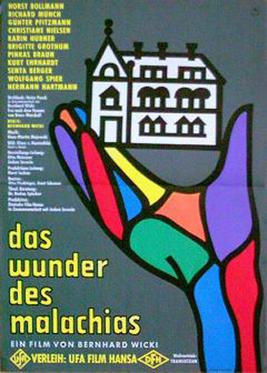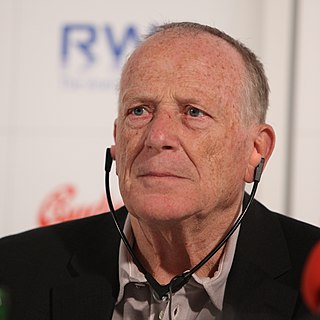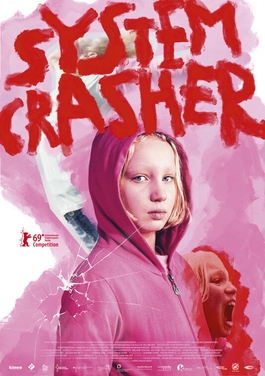
Frank Paul Beyer was a German film director. In East Germany he was one of the most important film directors, working for the state film monopoly DEFA and directed films that dealt mostly with the Nazi era and contemporary East Germany. His film Trace of Stones was banned for 20 years in 1966 by the ruling SED. His 1975 film Jacob the Liar was the only East German film ever nominated for an Academy Award. After the fall of the Berlin Wall in 1989 until his death he mostly directed television films.

Hans W. Geißendörfer is a German film director and producer.
Eric John Bryan Pratt, known professionally as John Bryan, was a British art director and film producer.
The Deutsches Filminstitut – DIF is an institute for the study of film, based in Frankfurt am Main, Germany.

The Berlin International Film Festival, usually called the Berlinale, is a major international film festival held annually in Berlin, Germany. Founded in 1951 and originally run in June, the festival has been held every February since 1978 and is one of Europe's "Big Three" film festivals alongside the Venice Film Festival held in Italy and the Cannes Film Festival held in France. Furthermore, it is one of the "Big Five", the most prestigious film festivals in the world. The festival regularly draws tens of thousands of visitors each year.

The Miracle of Father Malachia is a 1961 West German black-and-white film directed by Bernhard Wicki and starring Horst Bollmann. The film is based on the 1931 novel Father Malachy's Miracle by Bruce Marshall and tells the story of a supposed miracle in a West German town that is soon exploited and sensationalized by the media and profiteers. The film won several awards and was the official West German submission to the 34th Academy Awards for Best Foreign Language Film.

The Turning Point is a 1983 East German film directed by Frank Beyer and starring Sylvester Groth, Fred Düren and Klaus Piontek. The film is based on the 1977 novel of the same name by Hermann Kant, which was based on Kant's own experience as a prisoner of war in Poland. The film tells the story of a German prisoner of war at the end of World War II who is wrongly accused of being a war criminal. The film was controversial upon release as Polish commentators criticized that the film showed the Polish army wrongly accusing someone of war crimes. Nevertheless, the film was successful and won several awards and was the East German official submission to the 56th Academy Awards for Best Foreign Language Film.

Ildikó Enyedi is a Hungarian film director and screenwriter. She is best known for directing On Body and Soul, which won the top prize at the 67th Berlin International Film Festival among other awards, and was nominated for a Foreign Language Academy Award.

Ingeborg von Kusserow was a German film actress.

Wolfgang Kohlhaase was a German screenwriter, film director, and writer. He was considered "one of the most important screenwriters in German film history", and was one of the GDR's most well-known and prolific film screenwriters. Kohlhaase was awarded the Honorary Golden Bear at the 2010 Berlin International Film Festival.

Christian Petzold is a German film director and screenwriter. Part of the 21st century Berlin School film movement, he has received international recognition for directing films such as Jerichow (2008), Barbara (2012), and Phoenix (2014), all collaborations with actress Nina Hoss. For Barbara, Petzold won the Silver Bear for Best Director at the 62nd Berlin International Film Festival.

Renate Krößner, also known as Renate Krössner, was a German actress who was internationally recognized for roles in films and television. She was awarded the Silver Bear for Best Actress of the Berlinale for the title role in the 1980 film Solo Sunny. From 1985, she worked in West Berlin and was known for roles in TV series such as Tatort and Einmal Bulle, immer Bulle.

Sheer Madness is a 1983 German arthouse drama film directed by Margarethe von Trotta. It was entered into the 33rd Berlin International Film Festival.

Auschwitz is a 2011 German drama film directed by Uwe Boll.

The 41st annual Berlin International Film Festival was held from 15 to 26 February 1991. The festival opened with Uranus by Claude Berri. The Golden Bear was awarded to Italian film La casa del sorriso directed by Marco Ferreri. The retrospective dedicated to Cold War films was shown at the festival.

Stips is a 1951 West German romantic comedy film directed by Carl Froelich and starring Gustav Fröhlich, Heli Finkenzeller and Eva Ingeborg Scholz. It was shot at the Tempelhof Studios in West Berlin. The film's sets were designed by the art director Hans Luigi.

Three Girls Spinning is a 1950 West German comedy film directed by Carl Froelich and starring Albrecht Schoenhals, Adelheid Seeck and Axel von Ambesser. It was shot at the Tempelhof Studios in Berlin. The film's sets were designed by the art director Erich Kettelhut.

System Crasher is a 2019 German drama film directed by Nora Fingscheidt.

Oliver Herbrich is a German filmmaker working as an author, film director and producer. He is associated with the very end of the New German Cinema movement. From 2016 to 2018, his films were digitally remastered and re-released in the Fiction – Non-Fiction Film Edition. In 2018, the Film Museum Düsseldorf added all archival documents to its collection.

Ingeborg Bachmann – Journey into the Desert is a 2023 European co-production biopic-drama film directed by Margarethe von Trotta and stars Vicky Krieps in the titular role. The film depicts the life of Austrian poet and author Ingeborg Bachmann (1926–1973).



















